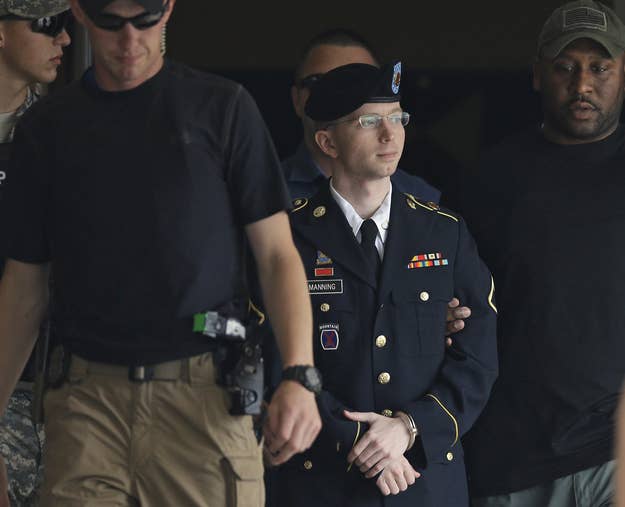
WASHINGTON — Capitol Hill's self-appointed defenders of liberty remained silent Tuesday on the conviction of the soldier who revealed a trove of American secrets, WikiLeaks source Bradley Manning.
Senators and members of the House who have taken the lead against the NSA surveillance apparatus — brought to their attention by the material leaked by Edward Snowden — chose not to comment on the conviction of Manning, who leaked hundreds of thousands of classified cables to WikiLeaks in 2010. Manning was convicted Tuesday of five charges under the Espionage Act, though he was found not guilty of aiding the enemy, the most serious of the charges leveled against him.
"I haven't had a chance to look at it," Senator Rand Paul said of the verdict while leaving an event where he was being given an award at a conference about whistleblowing sponsored by the ACORN 8 and Federally Employed Women-Legal Education Fund. Paul's address to the attendees focused on NSA domestic surveillance and on his interactions with the FBI over the nomination of James Comey, and didn't mention Manning, whose verdict had been read an hour and a half beforehand.
Senator Ron Wyden of Oregon and Rep. Marcia Fudge of Ohio were also given awards, though both sent representatives instead of showing up personally. A spokesperson for Wyden, who gave a blistering speech last week criticizing the expansion of the NSA's capabilities in recent years, did not return requests for comment.
"We don't have any comment on the verdict," said a spokesperson for Sen. Mark Udall, who, along with Wyden and Paul, has been one of the loudest anti-domestic surveillance voices in the Senate. Udall gave a speech on the Senate floor on Tuesday focusing on the NSA. He has described the NSA as "close to being unconstitutional."
Rep. Justin Amash, a libertarian Republican congressman from Michigan, also did not talk about Manning on Tuesday. There was no mention of Manning on his Facebook or Twitter feeds, which are normally more active than those of most other members of Congress.
Amash, along with Rep. Thomas Massie of Kentucky and three other House members, introduced an amendment to Congress last week that did not pass but would have severely limited the NSA's ability to surveil Americans. Going further, Amash has formally requested the resignation of Director of National Intelligence James Clapper.
The silence from the nascent liberty movement's voices in Congress illustrates the difficult spot these lawmakers find themselves in when it comes to the people responsible for releasing the very information they're using as a rallying cry. Most try to walk a fine line between relying on the leaked information and praising the leaker him or herself. And Manning, given his association with WikiLeaks and the sheer volume of the material he revealed, is a more controversial figure even than Edward Snowden. In an interview with Reason magazine, Amash's spokesperson Will Adams was asked: "Is Edward Snowden a hero or a traitor? How does he compare to Bradley Manning?"
Adams responded: "We are not yet familiar with all the details of whether or not Edward Snowden exhausted all possible internal remedies before giving the information to the media. It is important and a great benefit to the American people to know about this type of surveillance, which we believe threatens our constitutional rights."
Amash's office did not return requests for comment.
